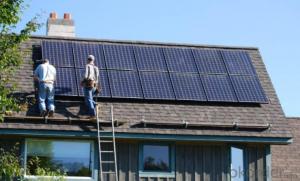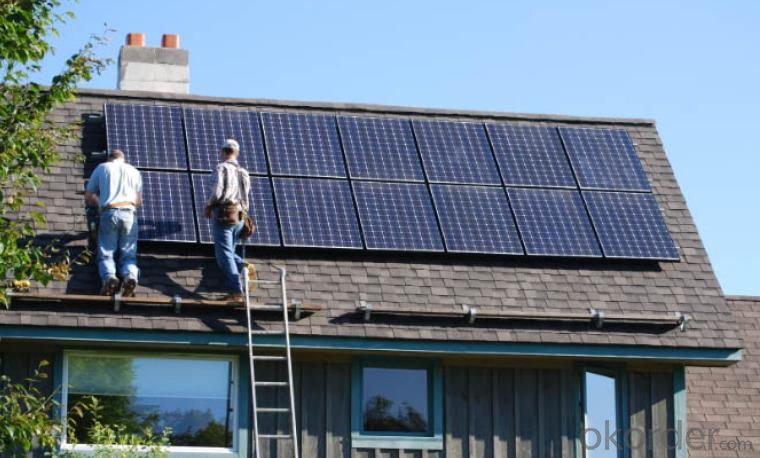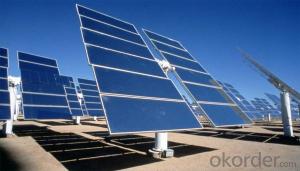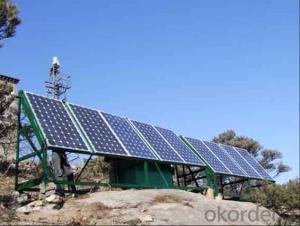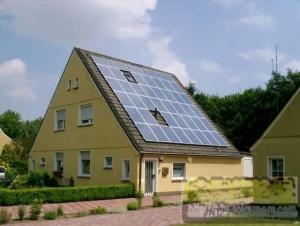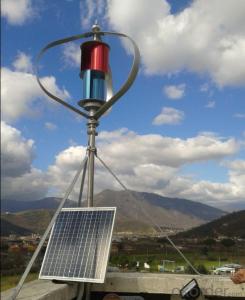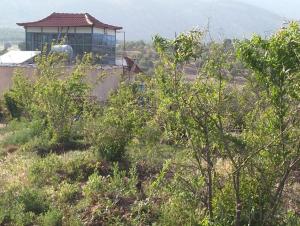Off-Grid Solar Power System 1000W High Efficiency
- Loading Port:
- China main port
- Payment Terms:
- TT OR LC
- Min Order Qty:
- 1 pc
- Supply Capability:
- 10000 pc/month
OKorder Service Pledge
OKorder Financial Service
You Might Also Like
1.Description of Product
Off-Grid Solar Power System is consisted of solar panel, solar charge controller, inverter, battery, mounting rack and cables.
(1).Grid-connected, send power to city grid
(2).MPPT technology, wide range of working voltage
(3).Simply Wiring, easy installation, customized design for your projects
(4).Low investment & long term feedback
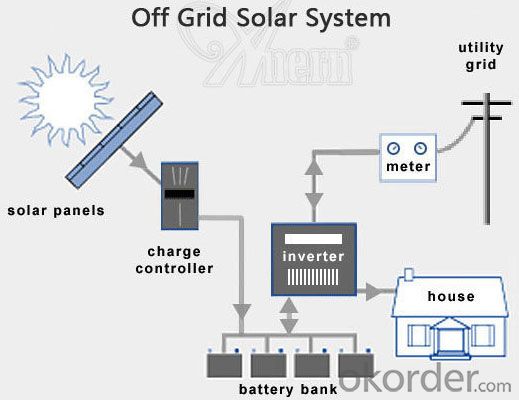
2. Off-Grid Features
1. Off grid solar power system is mainly used for application with relatively-small power consumption, and the areas have no grid network coverage, or grid power is unstable or outage condition.
2. It’s composed of solar panels, hybrid solar inverter, battery bank, solar panel mounting racks, and other accessories required fora complete home solar power system.
3. The battery bank gives a stable power output to the solar inverter which converts DC to AC to power loads, and provides power backup in rainy or cloudy days.
4. The solar panels generate electricity at daytime and charge the battery bank .
5. The off grid home solar power system provides grid power bypass in case of battery power shortage when sunshine is not enough.
6. All the off grid home solar power system configurations are worked out by scientific calculation and design.
Ref No. | 1KW |
Solar Panel | Type: Monocrystalline Silicon PV Module Max Power: 250W QTY:3 pcs |
Controller-Inverter Integrator | Rated Ouput Power: 1000W Rated DC Voltage: 24V QTY:1 pcs |
Battery | 12V/150AH per piece QTY:4 pcs |
Solar Panel Rack | Roof type mounting rack, anodized aluminum material, including complete fittings (Other type of racks can be customized as per client's requirement) QTY:1 pcs |
Cables | International standard, with specification suitable for solar system, RVV2*6 QTY:20m |
3.The Pictures of Product
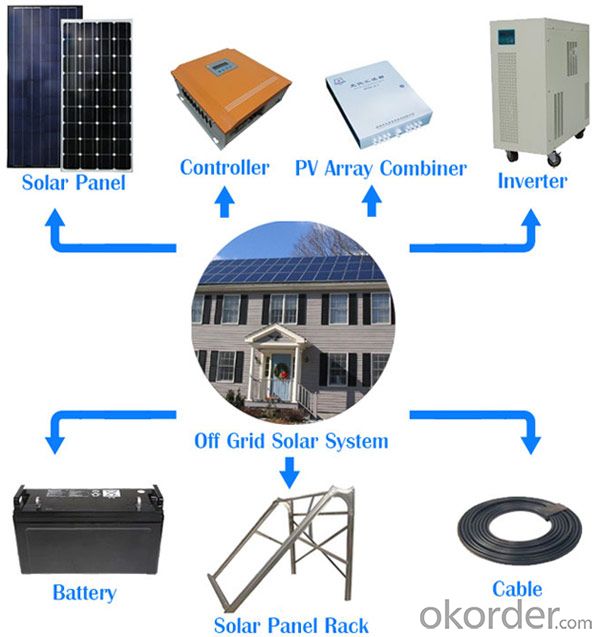
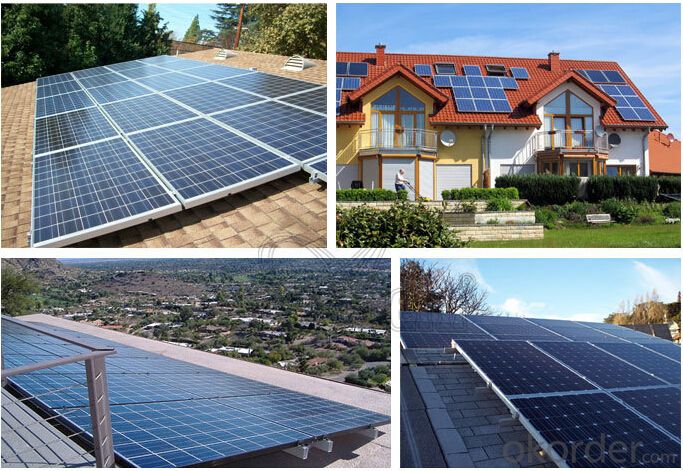
4.FAQ
Q1: What is the business type for the company?
A1: We are one of the biggest manufacturers inBejing.Chnia. Which is a high tech PV enterprise dedicated to the research, development, production and sales..
Q2: How long solar panel warranty can you offer?
A2: 10-Year product warranty,25-year linear power output warranty
If there is any quality problem, we will pay for freight and send free parts to you.
Q3: How many certificates do you have?
A3: We have 16 certificates,such as CE, TUV, UL, and so on.
Q4: Can I be the agent for you?
A4: Yes,We can discuss some information.
Q5: How to get a sample?How can cooperation with us
A5: contact us now.
- Q: How do solar energy systems impact the electricity distribution infrastructure?
- Solar energy systems have a significant impact on the electricity distribution infrastructure by reducing the strain on the grid and lowering the demand for traditional fossil fuel-based power plants. They decentralize power generation, allowing for a more distributed and resilient energy system. However, integration of solar systems requires grid upgrades and adjustments to accommodate bidirectional power flow, smart metering, and storage solutions, ensuring a reliable and efficient energy distribution network.
- Q: Can solar energy systems be installed on mobile homes?
- Yes, solar energy systems can be installed on mobile homes. In fact, they are a popular choice for mobile homeowners looking to reduce their reliance on traditional energy sources and lower their carbon footprint. Solar panels can be mounted on rooftops or on the ground near the mobile home, providing a sustainable and renewable source of electricity.
- Q: Can solar energy systems be used in areas with high levels of windborne debris?
- Yes, solar energy systems can be used in areas with high levels of windborne debris. However, it is important to consider certain factors to ensure their effectiveness and longevity. Installing protective measures such as a sturdy frame, debris shields, or regular cleaning and maintenance can help mitigate any potential damage caused by windborne debris.
- Q: What is the expected return on investment for a solar energy system?
- The expected return on investment for a solar energy system can vary depending on several factors such as the initial cost, location, available incentives, and energy usage. Generally, a solar energy system is expected to provide a positive return on investment over its lifetime. The initial cost of installing a solar energy system can be a significant investment, including the cost of solar panels, inverters, and installation. However, with the decreasing costs of solar technology in recent years, the upfront expense has become more affordable. The location of the solar energy system plays a crucial role in determining the expected return on investment. Areas with higher solar irradiance and longer sunshine hours tend to generate more electricity, resulting in a higher return. Additionally, the availability of net metering policies, which allow excess electricity to be fed back into the grid and credited to the owner, can further enhance the return on investment. Incentives and subsidies provided by governments and local authorities can significantly impact the expected return on investment. Many countries offer tax credits, grants, and rebates to encourage the adoption of solar energy systems. These incentives can reduce the initial cost and accelerate the payback period, enhancing the overall return on investment. Furthermore, the energy usage of the property is a critical factor in determining the expected return on investment. Higher electricity consumption means a greater opportunity for the solar energy system to offset utility bills, resulting in higher savings and an improved return on investment. While the specific return on investment can vary, studies have shown that solar energy systems typically pay for themselves within 5 to 10 years and continue generating free electricity for several decades. This extended period of energy production allows for significant savings on utility bills and a positive return on investment over the system's lifetime. Overall, investing in a solar energy system can provide long-term financial benefits through reduced electricity costs, potential revenue from excess electricity generation, and increased property value. It is crucial to perform a thorough evaluation considering the specific factors mentioned above to determine the expected return on investment for a solar energy system in a particular scenario.
- Q: How do solar energy systems affect property value?
- Solar energy systems can have a positive impact on property value as they are seen as a valuable and sustainable addition to a home. Studies have shown that homes with solar panels tend to sell faster and at a higher price compared to similar homes without solar systems. Additionally, solar energy systems can help reduce utility bills, making the property more attractive to potential buyers.
- Q: Can a solar energy system be installed on a library or educational institution?
- Yes, a solar energy system can be installed on a library or educational institution. In fact, many libraries and educational institutions have already embraced solar energy systems as a sustainable and cost-effective way to meet their energy needs. Installing solar panels on rooftops or in nearby areas can generate clean and renewable electricity, reducing carbon emissions and saving on energy costs. Additionally, educational institutions can use these solar installations as an educational tool to teach students about renewable energy and sustainability.
- Q: Can solar energy systems be used for powering electric car manufacturing plants?
- Indeed, electric car manufacturing plants can utilize solar energy systems. These systems harness the power of sunlight to generate electricity, which can then be utilized for diverse industrial operations, including the functioning of manufacturing plants. By implementing solar panels on the rooftops or open areas of the manufacturing facility, the plant can effectively tap into renewable energy to satisfy its electricity requirements. This not only diminishes the dependency on fossil fuels but also aids in curbing greenhouse gas emissions linked to conventional electricity generation. Moreover, by integrating energy storage solutions, solar energy systems ensure a consistent power supply, even during periods of limited sunlight or nighttime. Consequently, opting for solar energy systems to power electric car manufacturing plants is a sustainable and environmentally conscious decision.
- Q: Can solar energy systems be used for outdoor recreational activities?
- Yes, solar energy systems can definitely be used for outdoor recreational activities. Solar panels can be installed on rooftops, RVs, boats, and other outdoor structures to generate electricity. This renewable energy source can power various devices and equipment used during recreational activities such as camping, hiking, and boating. Solar energy systems provide a sustainable and environmentally friendly way to enjoy outdoor activities without relying on traditional power sources.
- Q: Can solar energy systems be used in powering research farms or agricultural laboratories?
- Certainly, research farms and agricultural laboratories can utilize solar energy systems to power their operations. Solar energy presents a clean and renewable power source that can be harnessed through the installation of solar panels. These panels convert sunlight into electricity, which can then be utilized to operate various equipment and facilities. The electricity needs of research farms and agricultural laboratories are often substantial, encompassing lighting, heating, cooling, and the operation of agricultural machinery. By making use of solar energy systems, these facilities can reduce their dependence on fossil fuels and diminish their carbon footprint. The installation of solar energy systems can occur on building rooftops or open land adjacent to the research farm or laboratory. The amount of solar energy generated is contingent on factors such as facility location, solar panel size, and sunlight exposure. Nonetheless, advancements in solar technology have made it possible for even areas with limited sunlight to benefit from solar energy systems. Apart from their environmental friendliness, solar energy systems can also yield long-term cost savings for research farms and agricultural laboratories. Once installed, solar panels have a lifespan of 25-30 years and require minimal maintenance. This translates to significant reductions in electricity bills, particularly in rural areas where grid connectivity may be unreliable or costly. Moreover, solar energy systems can provide a dependable power source, especially during peak demand periods or power outages. By incorporating battery storage systems, surplus energy generated during the day can be stored and utilized during nighttime or cloudy days, guaranteeing a continuous power supply for research activities. In summary, solar energy systems offer a feasible and sustainable solution for powering research farms and agricultural laboratories. They boast multiple advantages, including decreased environmental impact, long-term cost savings, and a reliable power supply. As the demand for renewable energy continues to surge, the integration of solar energy systems into agricultural facilities can contribute to a greener and more sustainable future.
- Q: Can a solar energy system be integrated with other energy sources?
- Yes, a solar energy system can be integrated with other energy sources. This integration is known as a hybrid energy system and is becoming more common as a way to enhance the reliability and efficiency of renewable energy systems. By combining solar energy with other sources such as wind, hydro, biomass, or even traditional fossil fuel generators, a hybrid system can provide a more stable and consistent power supply. This integration allows for energy production even during periods of low solar radiation or when there is no sunlight, ensuring a continuous power supply. Additionally, hybrid systems can also include energy storage technologies, such as batteries, to store excess energy generated by the solar panels for use during times of high demand or when solar energy production is low. Overall, integrating solar energy systems with other energy sources can help optimize energy production, increase reliability, and support the transition to a more sustainable energy future.
Send your message to us
Off-Grid Solar Power System 1000W High Efficiency
- Loading Port:
- China main port
- Payment Terms:
- TT OR LC
- Min Order Qty:
- 1 pc
- Supply Capability:
- 10000 pc/month
OKorder Service Pledge
OKorder Financial Service
Similar products
Hot products
Hot Searches
Related keywords
